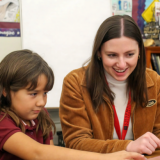People Don’t Like Smart
October 25, 2012
What is wrong with our society!? In a nation that talks the talk of high achievement and education for all students, why is there so much pressure placed on “normal?” Think about any young student starting school. How quickly do they learn to feel shame for non-English ways? How readily to they perceive that “pink is a girls color.” It doesn’t take them long to wish that mom would dress like “other” moms and leave the traditional dress at home.
In the classroom students begin a detailed ranking system that orders students by ability levels. James is a trouble maker and Justin follows the rules; Cynthia listens to the teacher and Juan is smart; Pablo doesn’t know his letters… The list goes on. Coupled with this ranking system is an insidious reality that conveys a dangerous message, “Don’t be too smart.” Eyes start to roll when kids are too smart. Slowly, intelligent students learn to hide their abilities and blend in. They come to understand that smart is only good to a certain degree- too smart can lead to loneliness and teasing.
This was a conversation in one of my classes recently, and it caused me to consider the manifestation of this in an adult learning environment. As a teacher of adults I witness this phenomenon. During class or workshop discussions, the most verbal participant who wishes to probe more deeply into learning can stick out like a sore thumb. While others coast on group dialogue and offer frugal bits to the conversation, this more engaged learner offers food for thought and complex insights. Their contributions are seldom met with enthusiasm; eyes roll or seat shifting begins. Have we taught this in our schools? Is this message so deeply ingrained in us?
In my PhD program, I have the pleasure of interacting with a group of fellow students and professors who are committed to learning. They enjoy the journey and encourage dialogue. Often times our conversations have extended beyond the classroom and into more private spaces- we share intellectual conversations at gatherings and impromptu get-togethers on and off campus. It is a very special experience.
As the third year of my PhD journey moves me closer to my goal, I am coming to the sober reality that these experiences will end when I achieve my goal of obtaining my degree. For this reason I find it important to live in the now. I must soak it all up- perhaps undo a past history of schooling that dampened my inquisitive nature.
By Marisol Rexach, Ph.D. in Education Student

